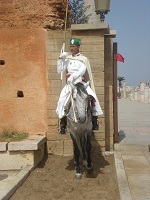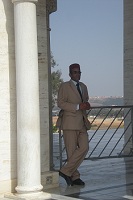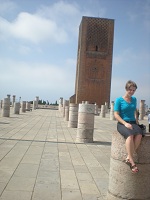Week 5 in Morocco
This week I was tasked with compiling a list of prospective candidates for another international expert position that the ABA will be providing to aid the ICPC in the creation, implementation, and evaluation of a civic education program in secondary schools aimed at combating corruption. Essentially, the idea is to fight corruption from the ground up. By building anti-corruption training into secondary school curriculums, we hope to reduce corrupt practices in future generations. An ideal candidate for the position is someone with experience implementing similar programs in other developing countries, preferably somewhere in the Middle East/North Africa (MENA) region, and in reporting on the effects (successes or failures) of the program. Furthermore, the expert must be willing to work in Morocco for the duration of the program creation (estimated 3 months) and must speak French or Arabic, in order to collaborate with members of the ICPC and the Ministry of Education.
I decided to cast a wide net and contacted various organizations involved in civic education to ask if they knew of anyone within their organization or networks that might be both suitable for and interested in such a position. Between the feedback from these organizations and my own research, finding scholars who had written papers or given presentations on the subject, our list of potential candidates grew extremely quickly. One of things that may prove difficult, however, will be finding someone who has experience in both creating/implementing a civic education program and in reviewing its effectiveness. So far, my research has shown that while many scholars do great work in analyzing the results of civic education programs, they might not have had a hand in creating the program that they are evaluating. The same goes the other way, in that those who create the programs leave the analysis work to others. Optimally, our international expert would be able to provide guidance on both aspects of the project. Inshallah. (God willing.) By luck of the draw, one of the scholars I contacted will be in Casablanca this coming Monday and so we have invited him for a preliminary meeting to discuss the project’s parameters and to inquire more about his expertise.
Tuesday was the beginning of Ramadan in Morocco. Moroccans fast by abstaining from eating or drinking from the time of the first call to prayer (approximately 3h30) to the fifth call to prayer (approximately 19h30). Side note: They change the hour to account for Ramadan, so I went from 5 to 4 hours ahead of EST. Children, pregnant or nursing women, women on their period, and the sick are not allowed to participate in Ramadan. While you might be thinking, that being on your period would be a gift- you get to eat and drink all day- people here really enjoy fasting for Ramadan. At some level, I find it belittling and chauvinistic to restrict women from prohibiting at certain times of the month. As the monarchy leads both the government and the faith, it is illegal for eligible Moroccans to not participate in the fast. Last year, a group of protesters hosted a picnic at noon in front of the parliament to make a statement. They were all arrested. There are rumors that they will do it again this year. We’ll see. Technically foreigners are allowed to eat and there are a select few hotel restaurants that remain open, but you get glares. Without thinking about it the other morning I brought a coffee mug with me to work, I realized what was wrong after noticing the stares I was receiving by the passerbys. To be honest, sometimes I sneak into bathrooms with a bottle of water to chug it out of sight. It’s a little awkward, I know, but it beats the stares. Generally, Moroccans are really appreciative of foreigners who try fasting. One, I made the mistake of telling a police officer that I was chatting with while waiting for the train that I was fasting out of respect for and to better understand the culture. He asked me if I believed that Allah is our God and Mohammed is His prophet. When I replied “No,” he told me not to bother fasting then. Other than that, we had a good conversation.
I tried to fast on the first day like everyone else, but failed miserably. First of all, I made the mistake of not getting up at 3h00 to have a large breakfast and to drink a ton of water. By 12h30, I had the worst headache from dehydration and had to cave. I went home, practically drank an entire liter of water, and ate an entire personal pizza! However, my failure at following Ramadan didn’t turn out to be a complete failure in the end. Being home during the day time gave me the opportunity to chat with one of the cleaning ladies that works for the family I am staying with. Her French is almost perfect, so we are able to communicate easily. We started talking about my work and ended up on her life story. It is truly remarkable. She began to work at the age of 6 and was never able to go to school. Looking back, she chuckled while saying that she started to work as soon as she could reach the sink to wash dishes by standing on a chair. 1 of 3 daughters, only her youngest sister was able to go to school for a few years before going to work to help support the family. When she first started working, she was required to live on site and didn’t see her family for over two years. All of the money that she earned went straight back to her parents. Knowing that she wanted to work for expats to earn more money someday, she dedicated herself to learning French. While working with children, she constantly asked them how to say objects in other languages. Eventually, she succeeded and became a chef for an expat family. Before taking the position, she demanded to live at home. Today, she is still able to live with her family but her position has changed again. Instead of only occupying herself with the kitchen, she now has to work as a chef and cleaning lady for roughly the same price. She argued that working conditions have really deteriorated in Morocco, stating that “although we have more rights, competition for work has become so tight that we must do twice as much work for the same salary.” Having been able to talk with a few Moroccan friends I’ve met along my travels, I’ve noticed that her sentiments are widely shared. Hearing her story truly expanded my perception of the country. I’m actually really grateful that I wasn’t able to make it through the day without eating because the outcome was far more rewarding than fasting.
Because of Ramadan, many shops in Morocco are closed or people work shorter hours. The ABA office works from 9-3 during the month of Ramadan, the cleaning staff at the house I’m living at work from 9-3, and my Arabic lessons have also been moved up to 4-6 so that my teacher can get back in time for the breaking of the fast, called Iftor. After my Arabic lesson, I was invited to my friend Khadiji’s house to experience an authentic Moroccan Iftor. Her whole family came together for the feast, which was comprised of all the traditional Ramadan foods- Harira, a soup; dates; Baghrira, Moroccan pancakes (best with honey); Chebakia, delicious and addictive sesame seed cookies covered in honey; and Sfouf, a dusty mix of nuts, chocolate, and flour (see picture of me holding tray of Sfouf below). We all sat around the table at 19h25, staring at the food, waiting for the call to prayer to sound. After eating there was another call to prayer and most of Khadiji’s siblings accompanied her parents to the Mosque. While heading back to my house, the streets were filled and the energy permeated the night air. Some were praying (the Mosque was so full that people were praying in the street just outside of the door), while others were joking over a cup of coffee and still others were eating.
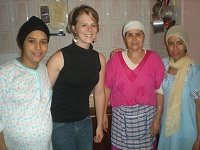
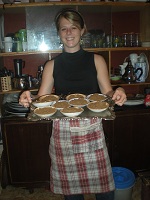
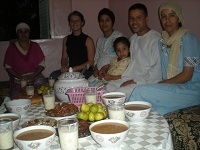
Thursday, I joined my school group for a tour of the Chellah. Chellah is an ancient Roman city located in Rabat. It’s actually practically my backyard. The remains are not the best maintained, but having been taken over and used by various civilizations, it provides a great opportunity to compare architectures and designs. For example, the city has both a Roman bath and an Islamic bath. In a Roman bath, the rooms are scattered around and don’t need to have any particular order. In an Islamic bath, however, there are always four rooms in a row. Each of the four rooms has a different purpose and temperature. Our guide spoke in Arabic (very slowly, since he was one of our teachers and knew our language level) and I actually found myself understanding what he was saying. Who would have thought that I’d ever be able to understand Arabic?!
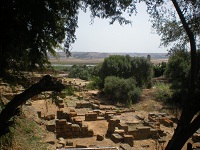
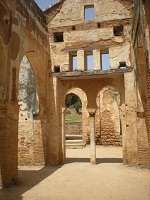
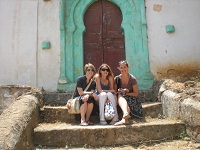
On Saturday, I travelled to Meknes. Meknes is one of the four imperial cities of Morocco and was the capital during the reign of Moulay Ismail (reigned 1672-1727). About 30 kilometers outside of Meknes is the best preserved Roman city in Morocco, called Volubilis. I chartered a taxi for the day to take me out to the ruins and hired a guide to lead me through. Ever since I took Roman Civilization in undergrad, I had been dying to see a real Roman ruin. Volubilis was a dream come true. The old houses still have mosaic floors that depict various Roman mythologies.
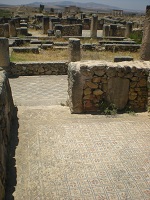
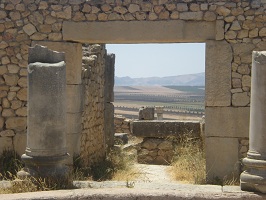
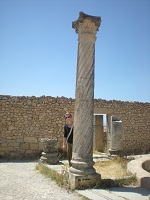
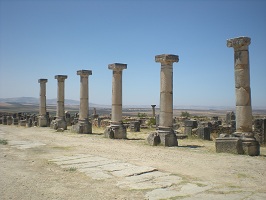
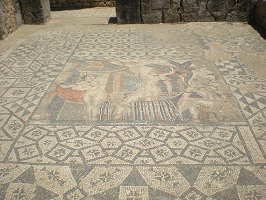
The surrounding country side was worth a visit itself. I was told that it looked just like Tuscany. Having never been to Tuscany, I can’t confirm either way, but it was breathtaking.
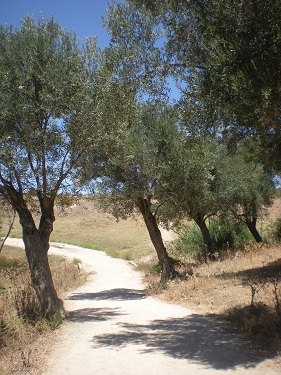
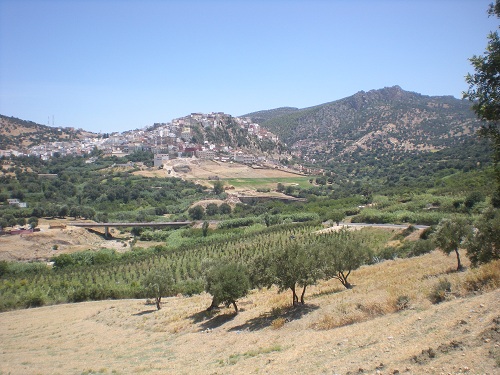
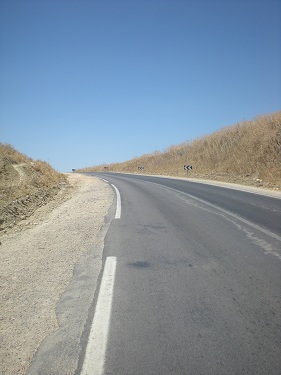
From Volubilis, we journeyed to Moulay Idriss, a small town that stands on top of a mountain surrounded my olive orchards. Moulay Idriss is the most sacred location in all of Morocco because it is where Islam was founded in the country and is where the founder is buried.
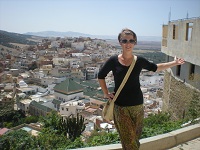
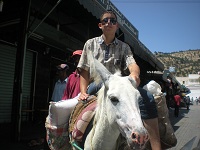
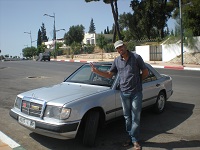
From here, I headed back to Meknes to follow the walking tour of the city found in my National Geographic guidebook. One of the stops was an old underground prison, in which the King of Morocco is believed to have housed his slave army. At one point, the prison contained 60,000 prisoners that were only allowed to see the sunlight when they were sent to forced labor. Not too far from the prison is the central square, Place el-Hedim. The King created the square by evicting local residents, rendering them homeless. Talk about land rights violations. Normally, the square is a bustling area filled with storytellers and fire-eaters. Unfortunately, due to Ramadan, only a sole pony stood in the center. I then made my way through the medina to the gardens before heading back to the train station. I bought some food to go and waited for Iftor. As soon as the call to prayer sounded throughout the city, people at the train station started sharing food with complete strangers. Even I was handed a Chebakia and some cactus fruit.
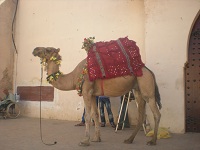
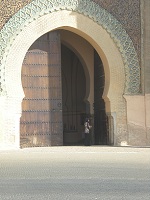
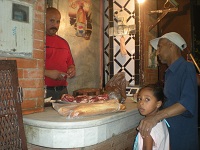
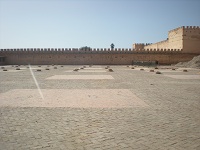
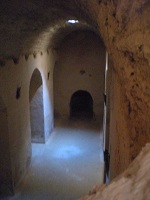
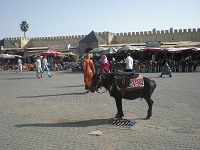
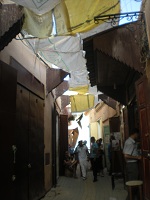
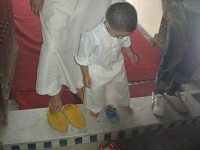
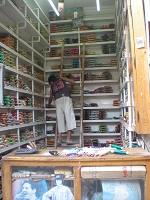
Sunday, I had a relaxing day in Rabat. I went out with a few interns to see the Tour Hassan, a local landmark. Tour Hassan was intended to be the largest Mosque in the world, however the treasury ran out of money and the project was never completed. Afterwards, I lounged around on the rooftop of my house, which is the second highest peak in the city and thought about my work this summer. Having spent last summer working for the federal government at the US Mission to NATO, the whole point of splitting my summer between a firm and a non-profit organization was to get a flavor for the many career opportunities available to someone with a law degree. Now is the time to start collecting my thoughts and reflect on my experiences to decide on a career path to focus on, at least for the short-term. Maybe by the end of next week, I will have found my calling.
